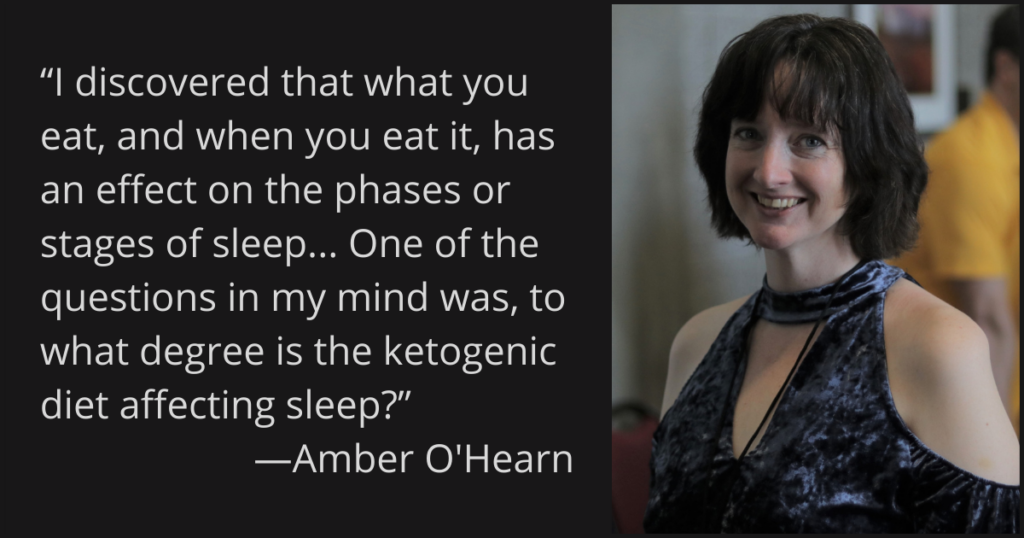Popular researcher and science writer Amber O’Hearn to present at 2022 Low Carb Boca Conference
Amber O’Hearn is an independent researcher and science writer who specializes in ketogenic and plant-free diets, and their connection to human evolution and health, as well as the physiological health-promoting effects of dietary interventions.
She is a self-proclaimed carnivore and is well known to her 45,000 Twitter followers for her insightful Tweets about nutrition and a wide range of related topics.
Amber will be one of 15 expert speakers presenting at the upcoming 2022 Low Carb Boca Conference to be held January 14-16. She will deliver a presentation entitled “Ketogenic Diets, Sleep, and Satiety.”

Ketogenic Diets, Sleep, and Satiety
Amber says she has been interested in the study of sleep for a long time, and during the past year she took a graduate course on the subject at University of Colorado Boulder.
“I’ve long had an interest in the impact of sleep on health and on mood,” she said. “But then when I became a parent, I really wanted to optimize sleep, because there’s so little time for it.”
She said she was in the process of trying to learn how she could get by on as little sleep as possible, as efficiently as possible, when she came across research about short sleep being used as a treatment for depression.
“It’s tricky research because you can’t sustain it,” she said. “If you try to put someone on a sleep deficient regime, it will often take away their depression, but then they will accumulate sleep debt and eventually they will need to sleep and then the effect goes away.”
It was while she was researching sleep and its relationship to depression in 2008 that she discovered the carnivore diet, which she says “fixed my mood problems.”
She began to see connections between the ketogenic diet and sleep. “There are certain things that sleep hygiene and diet hygiene seem to have in common,” she said, “and in particular, the connections between slow wave sleep and cognitive and metabolic health.”
Amber wrote a review paper on her research in an attempt to connect those ideas, and much of what she found related to energetics and metabolism.
“I discovered that what you eat, and when you eat it, has an effect on the stages of sleep, which can then have further effects on your health. One of the questions in my mind was, to what degree is the ketogenic diet affecting sleep?”
She started looking into whether the effects on depression that can be obtained from manipulating sleep can be achieved indirectly by manipulating a ketogenic diet.
“I will be discussing those relationships during my talk in Boca,” she said, “but I also plan to examine the relationship between sleep and satiety.”
More on satiety
“I plan to talk about satiety itself, because I think there’s a lot of confusion in the ketogenic diet sphere about what satiety means, and its importance,” said Amber. “There are people who advocate for trying to eat as little as possible and trying to trick your body into feeling satiety or satiation without providing enough energy for the body’s needs.”
Amber says when it comes to calories, less is not necessarily best.
“Many people are beginning to recognize that you often feel a lot better when more energy is moving through your system. So if you take in more energy, but your body also wants to burn a lot more energy, that feels better than when you’re taking in very little and expending very little.
In her talk, Amber plans to discuss the relationship between the amount of slow wave sleep that one gets and feelings of satiety. “These two things share common mechanisms in the brain, which I will explain.”
She also plans to discuss some misconceptions about sleep duration and how one can actually meet one’s sleep needs in more efficient ways.
Amber says she sees many other misconceptions when it comes to nutrition and diet.
“One thing I hear people say a lot is that weight gain happens because people eat past satiation. I think any sane definition of satiation would be contradicted by a statement like that unless you were being held down and forced to eat, because satiation means you stopped wanting to eat. If you continue to want to eat then you’re not satiated.”
Amber will also discuss the relationship between satiation and satiety, and factors that determine how long it is before one becomes hungry again.
Discovering Low Carb
Amber first started experimenting with a low carb diet in 1997, and had already been studying ketogenic diet and its effects on metabolism in her spare time for over a decade when in 2009 she discovered the near miraculous effects a carnivore diet would have on her health.
After her surprising health discovery, she started writing enthusiastically in various places around the Internet, and it wasn’t long before people started asking her to speak at conferences and appear on podcasts about the carnivore diet.
Amber has been speaking at conferences for the past four years, and in 2019 she organized and hosted the inaugural Boulder Carnivore Conference, AKA CarnivoryCon, to promote new research on plant-free diets.
Fat and Protein
“I advocate for a higher fat diet,” she said during a recent interview, “and I believe that in the context of a low carb diet, I don’t think fat makes you fat. I don’t think you need to reduce fat to become lean.”
Amber says she sees a great deal of emphasis on the importance of protein, but believes that in human evolutionary history, animal fat was at least as important as animal protein in the expansion of the human brain.
“When I look at a piece of meat, I don’t just see protein,” she said. “If I just saw protein, then there’d be a much better argument for taking some kind of lab meat or or plant protein product to isolate, and try to get an amino acid profile that is similar, but meat is so much more than protein.”
LDL Cholesterol
With respect to LDL cholesterol, Amber says she thinks we still have much to learn.
“My leaning is that LDL is really not a very good marker of disease because it has too many other functions. LDL carries both an immunological component and an energy component. And so if you see high LDL, that could be an indication that there is a lot of immune activation that’s needed to address something, so it’s a marker but not a cause of disease. Or it can simply be about energy transport, because it has this dual function. And I’m a lot less reluctant than Dave Feldman to go ahead and show my cards and say I don’t think that LDL is really causal at all.”
Influences
When asked about her biggest influences with respect to nutrition, and low-carb specifically, Amber said there are many people who have affected her work.
“I would definitely want to mention Gary Taubes,” she said. “I was absolutely struck by his work. I was already low carb when Good Calories, Bad Calories came out, but I cannot overemphasize how much that helped to explain some of the misconceptions people have.”
Amber says she has also learned a tremendous amount, especially with regard to the history of low-carb and meat-based diets from Stephen Phinney, MD, PhD. “He is very, very careful about making any recommendations or drawing any conclusions publicly that aren’t backed by research results, and I admire that.”
Others who have had strong influences on her work include Stephen Cunnane, Michael Wades, Siobhan Huggins, Georgia Ede, MD, and Richard Feinman, PhD.
Would eating less meat help the environment?
“I don’t see any way that eating less meat to help the environment makes sense,” said Amber. “If we think about the presence of ruminants in the environment all along, they co-evolved with humans and, and I don’t think reducing ruminants on the planet is in any way to save the planet. We have so much land that can only support ruminants, that cannot support the crops. I think it would be foolish to waste that land.
Not everything works for everybody
Amber says it’s understandable that people who discover a new lifestyle that works wonders for them become enthusiastic. She says they often think the same results will necessarily be achieved by anyone who tries to emulate those changes.
“But at a certain point, we have to also be a little bit humble and acknowledge that not everything works for everybody, even if it works for a lot of people. If someone is not getting the results that you expect, maybe there’s genuinely a problem.”
“When I first went carnivore, I was so overcome by the drastic health improvements that I became overzealous for a while. I believed so strongly in its ability to help people that I wasn’t ready to acknowledge when it failed that it could actually have just not been working for them.
A recent tweet Amber made summarized her feelings on this issue:
“If our protocol doesn’t work for you, you’re doing it wrong.” This is one of the most dangerous, insidious ideas repeated in nutrition circles. Once you say this, you are no longer operating as a scientist.
Carnivore diet and depression
In light of the success Amber has had in addressing her depression with the carnivore diet, she offered her thoughts on whether others might try it.
“I’ve been off all meds for 12 years, so it’s been a life-changer for me,” she said. “It’s all about risk and reward, in my view. The costs and risks associated with trying a carnivore diet are so low, and the potential upside is potentially high. For that reason, I think it’s really worth trying. Even if it only worked for 10% of people who tried it, when it does work it can be a complete life changer.”
Amber recommends anyone dealing with depression or mood disorder maintain appropriate clinical oversight.
“I think the best thing to do if you’re going to try it, is to commit to maybe three weeks or six weeks, so that you really give your body a chance to adapt.”
Thoughts on vegetarianism
As a carnivore with a large online following, Amber often comes up against individuals pushing for plant-based and vegetarian ways of eating.
“I think the primary reason people are attracted to veganism is an ethical one,” she said, “But I think the ethics are mistaken because humans require meat. And I know that this is somehow controversial, but I don’t really understand how we got to a point where this is being denied. The central question to me is, if humans require meat, then how can you possibly believe it’s ethically necessary to require a way of life that advocates divorcing humans from the diet that they are naturally adapted to?”
2022 Low Carb Boca Conference
Amber said she is looking forward to sharing her thoughts with the may practitioners and individuals for the 2022 Low Carb Boca Conference, both in-person and virtually. It’s not too late to secure your registration if you haven’t already!
In-person tickets include spectacular low-carb dinners on Friday and Saturday nights, and provide attendees with additional opportunities to meet and converse with presenters and other attendees.
The Virtual option is a great value for people who can’t travel at this time, and offers the ability to join in, and learn, while communicating with the worldwide community!
CME/CMHE credits are available for both options. And replays are available indefinitely to view and review depending on your schedule!

